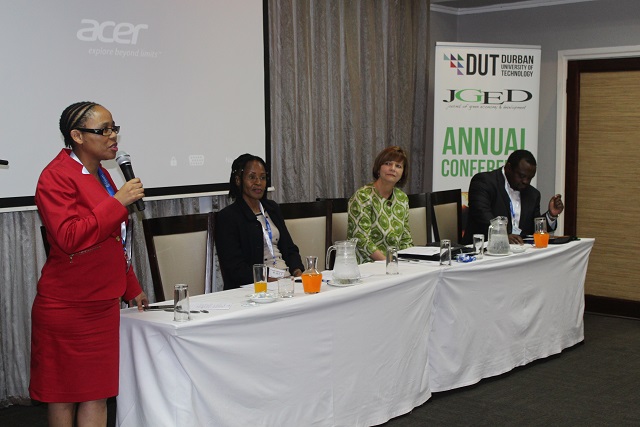This year (2016), the annual DUT Journal of Green Economy and Development (JGDE) Conference launched its Panel Session on HIV/AIDS where matters relating to HIV/AIDS within the green economy and development will be discussed.
The panel session will be held on a yearly basis within the conference which is hosted and organised by DUT in partnership with other stakeholders such as the KZN Premier’s Office, IQRAA Trust, eThekwini Municipality, the Department of Economic Development, Tourism and Environmental Affairs, Manchester University, the national Department of Public Service and Administration as well as the Institute of Economics at the Erlangen University, Germany.
On the session’s debut, conference organisers invited Dr Fikile Ndlovu; HIV/AIDS Directorate General Manager in the Office of the KwaZulu-Natal Premier; Professor Nceba Gqaleni, Honorary Research Professor at DUT; Dr Musa Gumede, eThekwini Municipality Deputy City Manager; Frances Chisolhm, USA Consular General and Dr Zodwa Ngobese, Unathi Consulting CEO to make presentations on issues relating to HIV/AIDS, the green economy and sustainability.
Dr Gumede told delegates that the eThekwini Municipality remains at the epicenter of HIV/AIDS and TB infections in KwaZulu-Natal, adding that adolescent girls and young women remain the hardest hit. He however added that through the Operation Sukuma Sakhe Programme, a multi-sectoral service delivery model which puts individuals, households and communities at its centre to tackle poverty, food security, health and environmental issues; major gains were being made in the fight against HIV/AIDS related problems.
Chisolhm centred her talk around how the green economy can help women and girls break the cycle of poverty which is often a great contributor to HIV infections. She also focused on DREAMS; an ambitious $385 million partnership aiming to reduce HIV infections among adolescent girls and young women in 10 sub-Saharan African countries. The goal of DREAMS is to help girls develop into Determined, Resilient, Empowered, AIDS-free, Mentored and Safe women. “The green economy can help. For example, we must help women become financially independent so they aren’t dependent on ‘blessers’ and abusive partners. By addressing climate change, we can protect agriculture for the woman farmer so she can be less vulnerable by breaking the cycle of poverty”, she said. Chisolhm also expressed her joy at South Africa’s Test and Treat move which means that any HIV positive person will receive antiretroviral medicine irrespective of their CD4 count by September 2016.
This move follows research that showed that this programme will help government save money in the long term, mainly because it radically reduces the chance of an HIV-positive person passing the virus onto others when they are on treatment and their viral loads are undetectable.
Dr Ngobese urged for multi-sectoral approaches in dealing with the HIV/AIDS scourge, saying that focusing on a single activity is often fatal, especially with regards to HIV/AIDS. “We have treated HIV like a baby in ICU and have kept that baby in ICU for a long time. It’s time for us to close the door and not getting more babies in that ICU. The best interventions in the world are born when we have academics giving scientifically sound advice which results in less wastage. We need all sectors, including esteemed academics, to help our country move forward,” she said.
Prof Gqaleni said while HIV used to be a divisive factor between civil society and government, the two sectors seem to be “marching together” post 2009. He said while the country has some good policies on HIV/AIDS, these are not embedded in communities.
In terms of treatment, Prof Gqaleni said there are other societal norms and contexts that are as effective as the mainstream, adding that other local solutions to the problem must also be sought. “I am proposing the manufacturing and commercialisation of traditional medicines,” he said, citing the successes of the University Research Co. LLC (URC) funded project which trained 520 Traditional Health Practitioners who were able to reach 22 715 patients/clients in eight months. Of these, 1 085 (+-5%) patients were screened for TB/HIV and referred to local clinics. In the Amajuba District alone, traditional health practitioners who were trained as part of this project were able to see about 9000 patients, referring close to 500 (to local clinics) for illnesses such as TB and STIs.
– Sinegugu Ndlovu
Pictured:The panelists; Dr Fikile Ndlovu; HIV/AIDS Directorate General Manager in the Office of the KwaZulu-Natal Premier; Dr Zodwa Ngobese, Unathi Consulting CEO; Frances Chisolhm, USA Consular General and Dr Musa Gumede, eThekwini Municipality Deputy City Manager.


